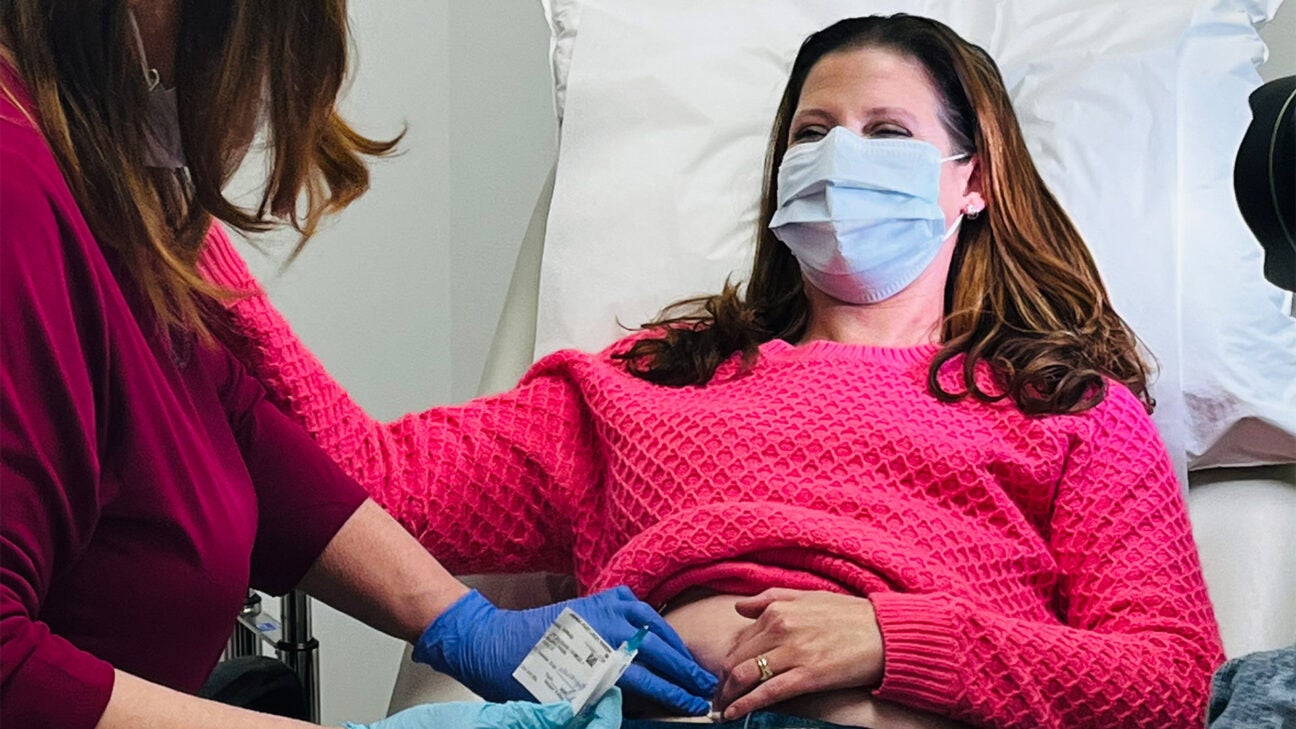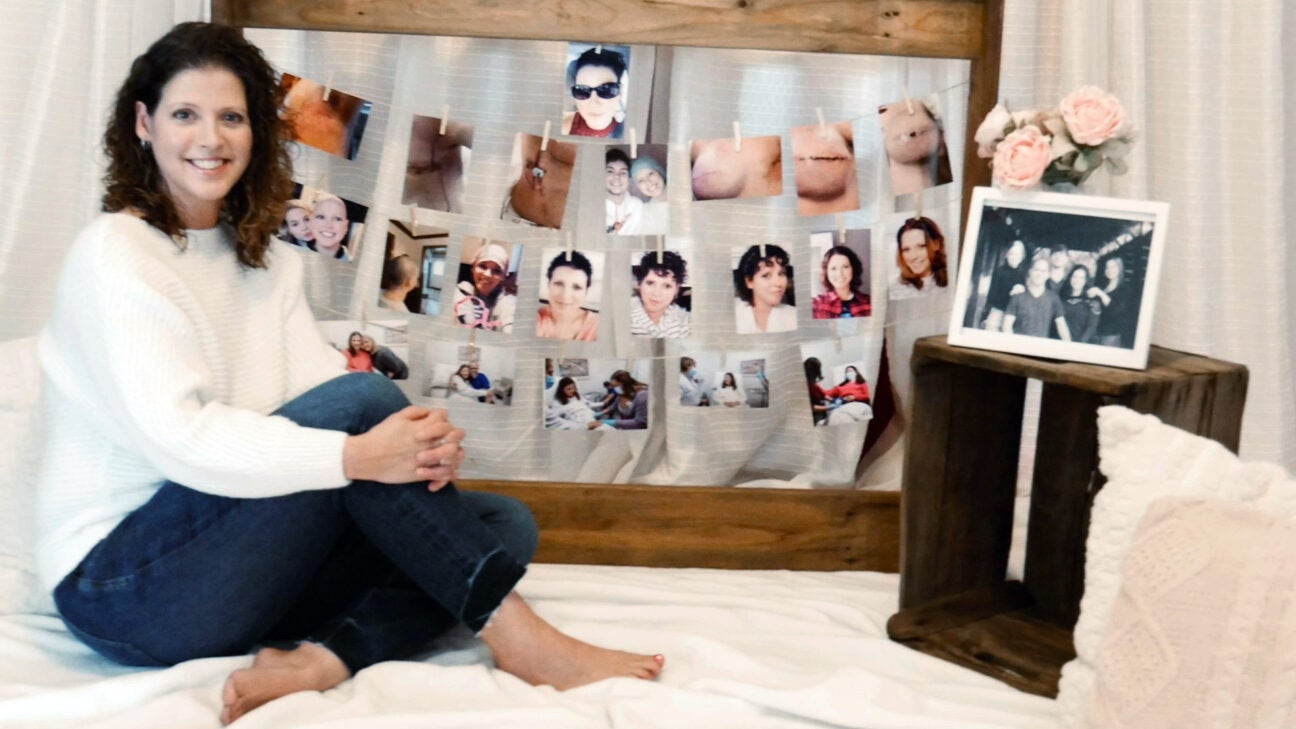
- A human clinical trial is underway for a breast cancer vaccine.
- Breast cancer survivor Jennifer Davis is the first person to receive the vaccine.
- Researchers hope the vaccine could rid the world of breast cancer in the near future.
What if a vaccine could eliminate breast cancer from the world?
Scientists behind a Cleveland Clinic and Anixa Biosciences clinical trial hope their vaccine may be the one.
“We believe that within 5 years this vaccine will be available for [people] who are breast cancer survivors and worried about recurrence and then 2 to 4 years after that we believe it can be available for all women, including women who have never had cancer, and potentially this vaccine could be an option for every woman in the world,” Amit Kumar, PhD, CEO of Anixa Biosciences, told Healthline.
The first human trial of the vaccine is focused on preventing recurrence in triple-negative breast cancer (TNBC) survivors like Jennifer Davis, who became the first person to receive the vaccine in 2021.
How life changed after diagnosis
In February 2018 at 41 years old, Davis discovered a lump on her breast. After several tests, she was diagnosed with TNBC.
TNBC typically grows fast, is more likely to have spread to other areas of the body once it is first detected, and has a higher reoccurrence rate after treatment than other types of breast cancer. Moreover, the survival rates for those with TNBC are generally not as high as they are for those who have other types of breast cancer, reports the American Cancer Society.
“I’m a nurse…but oncology isn’t my specialty and I didn’t know much about triple negative and it’s all over the [internet as the] most lethal form and prognosis is poor, death is high, and the first thing I told [my family when I was diagnosed] is don’t Google triple negative,” Davis told Healthline.
As a resident of Ohio, she decided to get a second opinion from Cleveland Clinic and then received treatment there.
She underwent multiple rounds of chemotherapy followed by a double mastectomy and then 26 rounds of radiation.
“With triple negative, there’s nothing you can take following your treatment to put your mind at ease that you won’t have a recurrence,” said Davis.
Around the time she completed treatment, technology for the breast cancer vaccine, which was developed at Cleveland Clinic, was approved for use in human clinical trials by the Food and Drug Administration (FDA).
Davis was invited to participate and she didn’t hesitate to accept.
“When the opportunity became available to me [to participate in the trial] it wasn’t something that I was scared of,” said Davis. “I feel very lucky and fortunate that I was able to get everything I needed to get done in time to qualify for the trial and then actually receive it.”
On October 19, 2021, she received the first dose, followed by two more doses, two weeks apart.
“The only side effect I had was lumps at the injection site. Nothing short-term or anything over the past year and half, which is pretty amazing,” said Davis.
Following the vaccination, she had two follow-up appointments and now follows standard screening and monitoring with her breast specialist.
The science behind the vaccine
The vaccine was in the works for more than 20 years before it reached the human trial phase.
Vincent Tuohy, PhD, a researcher in the Department of Inflammation and Immunity at the Cleveland Clinic invented the vaccine. While he passed away in January 2023, his groundbreaking research continues to carry on.
Tuohy identified that a protein called α-lactalbumin (aLA), which is produced in pregnant and lactating people is often a precursor to cancer.
While aLA is necessary to produce breast milk, when a woman stops lactating, the body stops making the protein.
“The discovery that was key here is that later on in life when women develop breast cancer, those cancer cells are making this protein again even though she’s not lactating,” said Kumar.
Tuohy hypothesized that if a vaccine could train a woman’s immune system to attack the cells making aLA then when those cancer cells arise, the immune system would be ready to destroy the cells before they have a chance to reproduce and become a tumor.
“Animal studies proved this right and Dr. Tuohy’s lab was able to demonstrate that they could eliminate cancer—maintain mice that are designed to get cancer, and by vaccinating them, eliminate onset of cancer in 100% of those mice,” Kumar said.
Although mice are different than humans because they are kept in the same cage, fed the same diet, grown the same, and don’t experience factors of human life like stress and varied ethnic and genetic backgrounds, scientists are hopeful that the results will be similar in humans.
“We’re hoping we get 100% response in women as well but even if we get 80%, that’s great,” said Kumar.
So far, 15 women who are survivors of TNBC have taken the vaccine and all have shown an immune response. However, by the time the vaccine is approved for use, Kumar said thousands of women will need to be tested.
While the women are currently being studied to see if the vaccine will prevent the recurrence of cancer, Kumar said the end goal is to administer the vaccine before cancer is diagnosed.
“We think if this vaccine works really well throughout the clinical trials it’s going to change the world, it’s going to change the way we think about cancer, it’s going to change the way cancer research is done,” said Kumar.
He said that researchers believe the vaccine will also work on multiple types of breast cancer.
“So potentially…we think we might be able to eliminate almost all breast cancers,” he said.

Clinical trials are life-saving
Clinical trials are essential to the progression of treatment for TNBC, said Dr. Francisco Esteva, chief of breast medical oncology at Northwell Lenox Hill Hospital.
“A few years ago, all we had was chemotherapy. Now there’s antibody-drug conjugate (ADCs) that are now used in routine care for these patients,” Esteva told Healthline.
While experimental vaccines for breast cancer have existed for many years, he said so far none have shown improvement in survival rates. However, he has hope that through well-designed, randomized clinical trials that are approved by scientific and ethics committees, patient advocates, the FDA, and government entities, a vaccine will be effective.
“Clinical trials are really important because what we do today as standard of care was only a clinical trial a few years ago,” said Esteva. “For someone who has completed all their treatment and has no additional effective treatments available to them, it’s very important to consider clinical trials.”
Davis knows this too well. She said participating in the trial is rewarding not only in the moment but also because of what it means for the future.
“[It’s amazing] that one day, [breast cancer] could not exist and women won’t have to worry about it or go through any of it. I have daughters and a mom,” she said. “I look forward to the day that we can say this vaccine works.”
Meet Jennifer Davis. The First Woman to Receive a New Vaccine for Breast Cancer
Source: Pinoy Lang Sakalam



0 (mga) komento:
Mag-post ng isang Komento